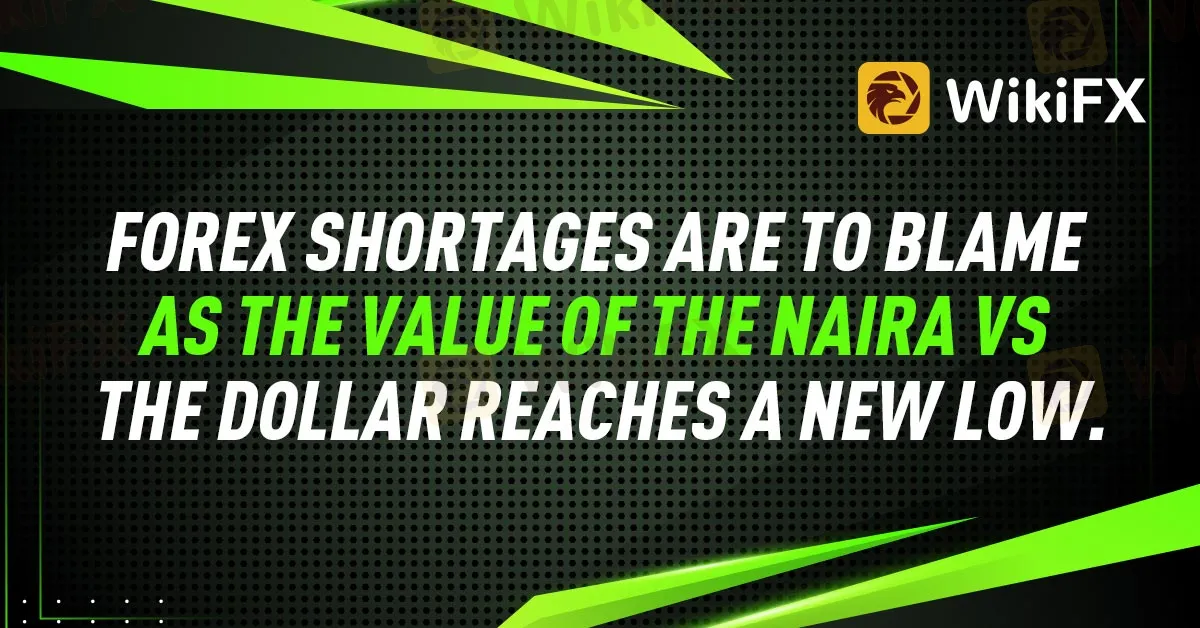简体中文
繁體中文
English
Pусский
日本語
ภาษาไทย
Tiếng Việt
Bahasa Indonesia
Español
हिन्दी
Filippiiniläinen
Français
Deutsch
Português
Türkçe
한국어
العربية
FOREX SHORTAGES ARE TO BLAME AS THE VALUE OF THE NAIRA VS THE DOLLAR REACHES A NEW LOW.
Abstract:According to research, the recent decline in the value of the naira currency to an all-time low of 735 against the dollar may have been caused by a rise in the demand for foreign money. One currency trader in Nigeria predicted that the naira will weaken much more in October, reaching 750 to the dollar.

According to research, the recent decline in the value of the naira currency to an all-time low of 735 against the dollar may have been caused by a rise in the demand for foreign money. One currency trader in Nigeria predicted that the naira will weaken much more in October, reaching 750 to the dollar.
Limited Foreign Exchange
The naira's parallel to 735 units per dollar on September 29, which caused the Nigerian currency to depreciate further against the US dollar. The latest decline in the value just days after the Central Bank of Nigeria (CBN) announced an increase in the monetary policy rate of 150 basis points (bps) (MPR).
Before the CBN raised interest rates, stated that on the foreign exchange black market, one dollar bought 720 naira. The Central Bank of Nigeria has said speculators may be to blame for the naira's decline.
However, a study in the Business Post suggests that the recent decline in the value of the naira may be related to both the dearth of foreign currency and the rise in demand for it. According to the study, the official markets over 95% increase from $119.49 million to $223.30 million, may have contributed to the naira's decline to a new all-time low.
Official Naira Exchange Rates Have Not Changed
The story cites a currency dealer from the Egbeda neighborhood of Lagos State in Nigeria to support the claims that shortages of foreign cash have also contributed to the currency's decline. Another currency dealer, Alhaji Isa, reportedly urged Nigerian citizens to shift their money to dollars because “at the way things are moving, N750/$1 next month might be the rate,” according to the currency dealer.
The Naira's volatility against the dollar in the black market worse on Wednesday by the growing demand and dearth of available dollars.
On Wednesday, currency traders at the black market in Uyo exchanged one dollar for N700.00 and sold it for between N703.00 and N705.00.
The market was dispersed today; there was a great demand but a lack of money. The banks aren't giving us the deals we desire. Customers are not receiving the amount of money they are seeking from them, which is why there is a shortage.
As a result, the naira has lost 0.4% of its value over the last three working days.
The Naira at the NAFEX window was N436.50 per $1, the lowest official market rate it has ever reached. The currency fluctuated within an intraday range of N437.50 (low), shot up to a high of N418.00, and then settled at that price.
The Naira has been fluctuating over the past few weeks and months between N419.00 and N430.00 and higher, despite persistent inflationary pressures, a rise in foreign exchange demand, and dwindling foreign reserve.
The CBN continues to set the naira's little under 440 units of the local currency for every dollar, despite several reports that claim the naira is losing ground against other currencies on the forex parallel market.
The difference between the official and black-market exchange rates consequently increased to 65%, the currency's highest difference since 2016.

Disclaimer:
The views in this article only represent the author's personal views, and do not constitute investment advice on this platform. This platform does not guarantee the accuracy, completeness and timeliness of the information in the article, and will not be liable for any loss caused by the use of or reliance on the information in the article.
Read more

Malaysian-Thai Fraud Syndicate Dismantled, Millions in Losses Reported
The Royal Malaysia Police (PDRM) has received 26 reports concerning the Nicshare and CommonApps investment schemes, both linked to a major fraudulent syndicate led by a Malaysian citizen. The syndicate’s activities came to light following the arrest of its leader by Thai authorities on 16 December.

WikiFX Review: Is FxPro Reliable?
Founded in 2006, FxPro is a reputable UK-based broker, trading on various market instruments. In this article, we will help you find the answer to one question: Is FxPro reliable?

Geopolitical Events: What They Are & Their Impact?
You've heard many times that geopolitical events have a significant impact on the Forex market. But do you know what geopolitical events are and how they affect the FX market? Let us learn about it today.

Why Do You Feel Scared During Trade Execution?
Trade execution is a pivotal moment for traders. It is when analysis turns into action, and potential profits or losses become reality. However, for many traders, this moment is accompanied by fear. Why does this happen, and how can you address it?
WikiFX Broker
Latest News
ASIC Sues Binance Australia Derivatives for Misclassifying Retail Clients
Geopolitical Events: What They Are & Their Impact?
Top 10 Trading Indicators Every Forex Trader Should Know
WikiFX Review: Is FxPro Reliable?
Malaysian-Thai Fraud Syndicate Dismantled, Millions in Losses Reported
Trading frauds topped the list of scams in India- Report Reveals
Why Do You Feel Scared During Trade Execution?
WikiFX Review: Something You Need to Know About Markets4you
Revolut Leads UK Neobanks in the Digital Banking Revolution
Fusion Markets: Safe Choice or Scam to Avoid?
Currency Calculator


